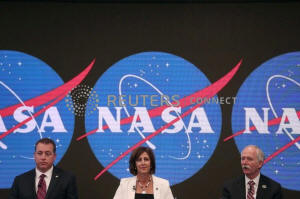|
Got $50 million for a vacation? NASA to
open space station to private citizens
 Send a link to a friend
Send a link to a friend
 [June 08, 2019]
By Makini Brice and Eric M. Johnson [June 08, 2019]
By Makini Brice and Eric M. Johnson
WASHINGTON/SEATTLE (Reuters) - NASA will
allow private citizens to stay at the International Space Station (ISS)
for month-long getaways at a cost of about $35,000 per night, the U.S.
space agency said on Friday.
The shift reverses a long-standing prohibition against tourists and
private interests at the orbiting research lab, and reflects a broader
push to expand commercial activities at the ISS and in space more
generally.
It paves the way for private citizens to travel to the ISS aboard
rocket-and-capsule launch systems being developed by Boeing Co and Elon
Musk's SpaceX. The two companies are set to ferry astronauts to the ISS
from U.S. soil for the first time in nearly a decade.
NASA will allow up to two private trips to the station per year, each
lasting up to 30 days, NASA said. The first mission could be as early as
2020.
But the ride won't be cheap.
NASA estimated the cost of a flight would be around $50 million per
seat. In addition, NASA will charge visitors for food, storage and
communication once at the station.
"If you look at the pricing and you add it up, back of a napkin, it
would be roughly $35,000 a night, per astronaut," NASA's Chief Financial
Officer Jeff DeWit told a news conference in New York.
"But it won't come with any Hilton or Marriott points," DeWit
deadpanned.
NASA's Russian counterpart Roscosmos has already allowed a number of
private citizens at the station.
[to top of second column]
|

CFO NASA Headquarters' Jeff DeWit, Robyn Gatens, Deputy Director,
International Space Station at NASA Headquarters, and Bill
Gerstenmaier, Associate Administrator, NASA's Human Exploration and
Operations Mission Directorate, NASA Headquarters, sit during a news
conference announcing that NASA is opening the International Space
Station for commercial business, so U.S. industry innovation and
ingenuity can accelerate a commercial economy in low-Earth orbit, at
the NASDAQ Market site at Times Square in New York City, U.S., June
7, 2019. REUTERS/Shannon Stapleton

NASA officials also said opening the door to private enterprise
gives the agency more room to focus on the Trump administration's
goal of returning to the moon by 2024, which could be fueled in part
by revenue generated from new commercial services and paying
astronauts.

Arrangements for the trip were being left to Boeing and SpaceX, NASA
said.
(Reporting by Makini Brice in Washington, Eric M. Johnson in Seattle
and Joey Roulette in Orlando, Florida; Editing by Susan Thomas and
Rosalba O'Brien)
[© 2019 Thomson Reuters. All rights
reserved.]
Copyright 2019 Reuters. All rights reserved. This material may not be published,
broadcast, rewritten or redistributed.
Thompson Reuters is solely responsible for this content. |